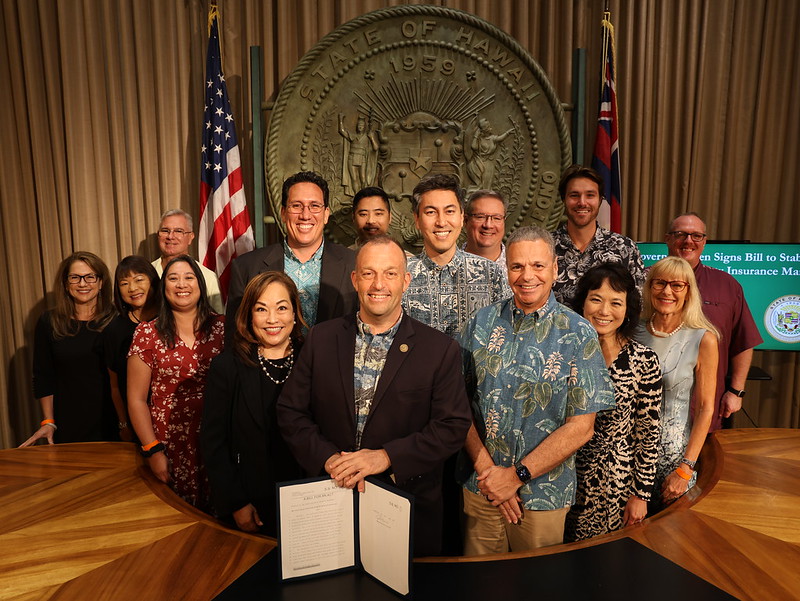Honolulu, Hawaiʻi – Governor Josh Green, M.D., today signed two significant bills into law aimed at stabilizing Hawaiʻi’s property insurance market and expanding essential resources for youth and young adults experiencing homelessness. These measures come as the state continues to grapple with a complex housing crisis.
“The rising cost of insurance has become yet another unbearable burden for Hawaiʻi and its residents over several years and mirrors a similar crisis on the mainland,” said Governor Green. “I am appreciative of the Legislature, the Hawaiʻi Insurance Division and all the passionate stakeholders for the dedicated and collaborative effort over the past two years as we addressed this challenge.” He also stated that his administration remains committed to actively reducing barriers to safe, stable, reliable, and insurable housing for all residents.
SB 1044 (Act 296): Stabilizing the Property Insurance Market
Senate Bill 1044 (Act 296) is designed to address the instability in Hawaiʻi’s property insurance market, which has been exacerbated by local and national environmental disasters, leading to escalating premiums and limited coverage options.
The new law reactivates the Hawaiʻi Hurricane Relief Fund (HHRF) to provide insurance coverage in situations where the private market cannot. The HHRF, originally formed in 1993 after Hurricane Iniki to fill gaps in hurricane insurance coverage, had become dormant. It was reactivated by Governor Green in 2024 to respond to current market instability.
Applications are now being accepted by the HHRF specifically from Condominium and Townhouse Associations of Apartment Owners (AOAOs) seeking hurricane commercial property insurance coverage. To be eligible, an AOAO must have been previously denied hurricane coverage by at least two state-licensed insurance companies and have buildings with a total insured value exceeding $10 million. It’s important to note that commercial property insurance policies offered under the HHRF are limited to hurricane coverage only and provide excess coverage for losses above $10 million; AOAOs must purchase separate primary insurance for losses up to $10 million. All applications must be submitted through a licensed insurance producer.
Acting Insurance Commissioner Jerry Bump stated, “We anticipate this program can provide every eligible association with full coverage or a portion of their full coverage. In just two weeks, we’ve seen pricing pressure and market competition significantly decrease the cost of coverage.” Alex McLaury, a commercial insurance agent, added that some properties have already seen upwards of 70% savings on their hurricane insurance.
Act 296 also enhances the powers of the Hawaiʻi Property Insurance Association (HPIA) to offer additional coverage options, establishes the Condominium Loan Program to help buildings remain insurable, and mandates the Insurance Commissioner to conduct a comprehensive study for market stabilization strategies.
Senator Jarrett Keohokalole, Chair of the Senate Commerce and Consumer Protection Committee, called the bill “a lifeline for thousands of Hawai‘i residents crushed by soaring insurance costs.” Representative Scot Z. Matayoshi, Chair of the House Consumer Protection and Commerce Committee, highlighted that the bill targets average condominium buildings, not just luxury high-rises, and includes a low-interest loan pilot program to encourage high-impact repairs that should lower premiums and raise unit values.
More information about the HHRF, including FAQs and application forms, is available at https://hhrf.hawaii.gov.
HB 613 (Act 297): Making Homeless Youth Pilot Program Permanent
House Bill 613 (Act 297) makes permanent the youth pilot program originally established under Act 130, Session Laws of Hawai‘i 2022. This measure aims to create a safe space and youth program in each county for youth and young adults experiencing or at risk of homelessness.
These safe spaces will provide 24/7 access to lodging, meals, showers, medical and behavioral health services, as well as educational and employment support. Through joint efforts of state and county departments, those in need of further support will be connected to nonprofit institutions offering long-term support and shelter. The program will report its progress to the Legislature. The bill appropriates $871,016 for fiscal year 2026 and $1.8 million for fiscal year 2027.
“This is how we break the cycle of homelessness,” said Governor Green. “By investing in people, especially our youth, we are shaping a future where everyone has a chance to thrive. This program shows what is possible when a community comes together with a purpose.”
Representative Lisa Marten, Chair of the House Committee on Human Services and Homelessness, highlighted that the program makes 24-hour access to shelter, mental health care, education, and job training permanent, calling it “a lifeline for our most vulnerable youth.” The program will continue services on Oʻahu and Hawaiʻi Island, with plans for statewide expansion.
The complete list of bills signed today also includes SB 1231 (ACT 298) relating to Parentage. Full details of enacted laws are available via links on the Governor’s official press release.

